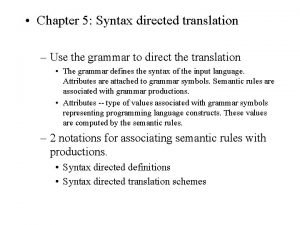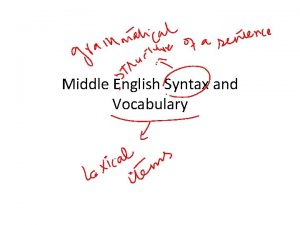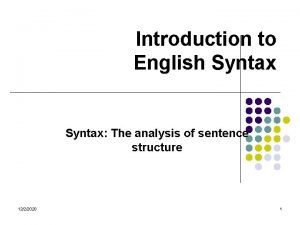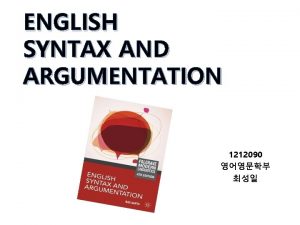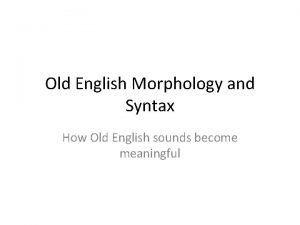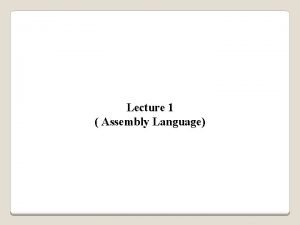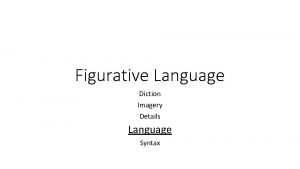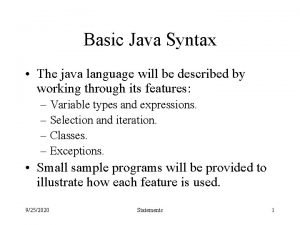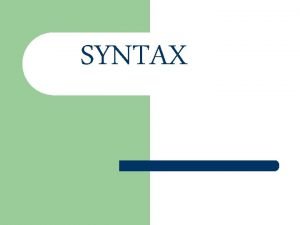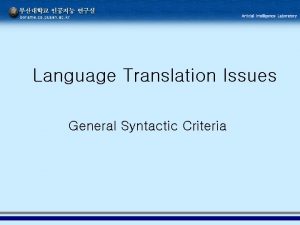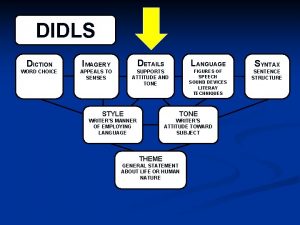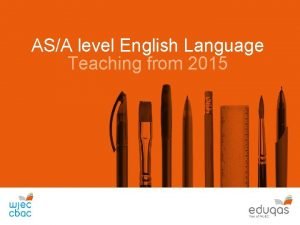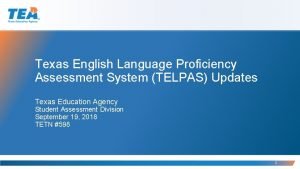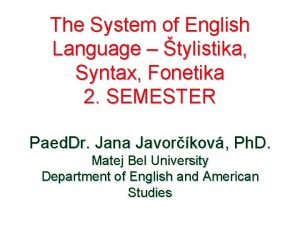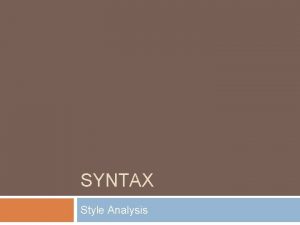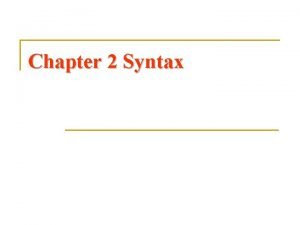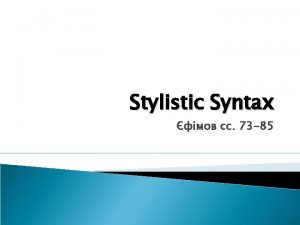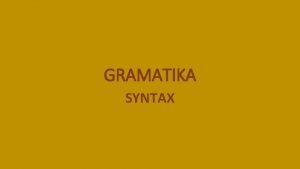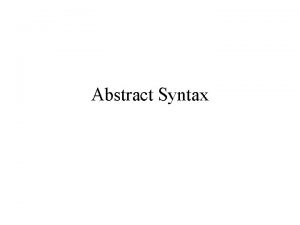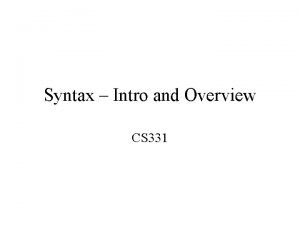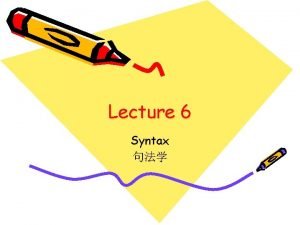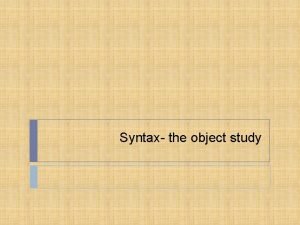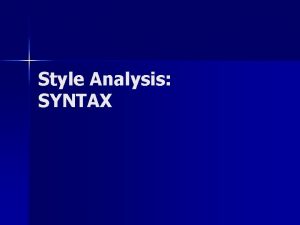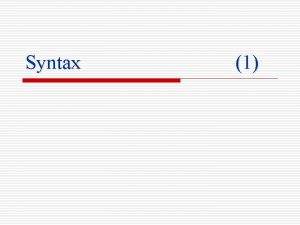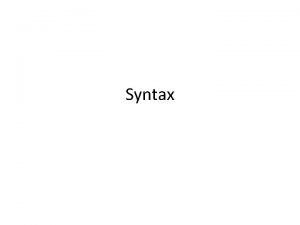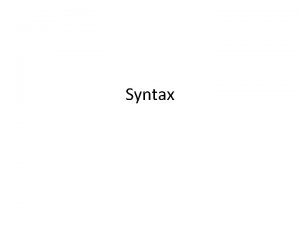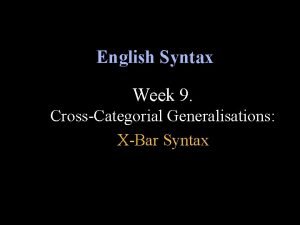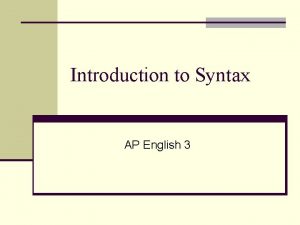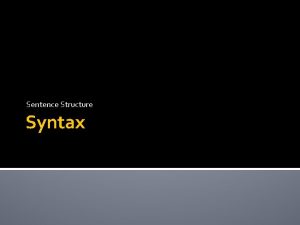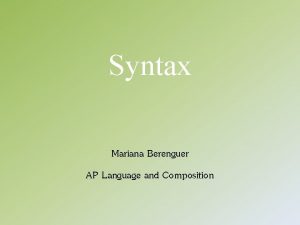The System of English Language tylistika Syntax 2
























































- Slides: 56

The System of English Language – Štylistika, Syntax 2. SEMESTER Paed. Dr. Jana Javorčíková, Ph. D. Matej Bel University Department of English and American Studies

Today´s plan: 1. SYNTAX/SYNTAX 2. STYLISTICS /ŠTYLISTIKA 3. Aspect – Voice - Mood 4. PHONETICS/PHONOLOGY - drill

1. SYNTAX - definition = concerns (sa zaoberá) word order = is the part of grammar that concerns the structure of phrases or sentences (Štulajterová, 68).

Basic Terms in Syntax: 1. WORD ORDER = slovosled 2. SENTENCE (SIMPLE, MULTIPLE) = jednoduchá, zložená veta 3. ELEMENT OF SPEECH = vetný člen 4. SENTENCE PHRASE = vetná fráza

(1) WORD ORDER = Slovosled - Important aspect of grammatical correctness; - English = analytical type of language (word order is fixed – pevne stanovený): e. g. : John loves Mary - Mary loves John. You are tired - Are you tired? Only he met the teacher - He met only the teacher

(2) Sentence and meaning Types of sentences: A) Statements/Oznamovacie B) Questions C) exclamations and commands/Zvolacie a prikazovacie According to their structure: A) simple B) multiple (zložené): b. 1: compound (John came and Betty left) or b. 2: complex (Betty left because John came).

(3) Parts of Speech (Elements of speech) = vetné členy Ø Subject = podmet Ø Verb = sloveso Ø Object = predmet MANDATORY=POVINNÉ Ø Complement = doplnok Ø Adverbials = príslovkové určenie Ø Adjective = prídavné meno

Exercise 1: Identify the word order (SV, SVOA, SVOC) 1. 2. 3. 4. 5. 6. 7. 8. She has left home. She has left her diary at home. John washed himself. The train has arrived. Get me out of here. He found his stolen bicycle. He found his bicycle stolen.

Exercise 1: Identify the word order (SV, SVOA, SVOC) 1. 2. 3. 4. 5. 6. 7. 8. She has left. (SV) She has left home (SVOA) She has left her diary at home (SVOA) John washed himself (SVO) The train has arrived (SV) Get me out of here (SVOA) He found his stolen bicycle (SVO) He found his bicycle stolen (SVOC)

(4) Sentences and phrases Phrase = a building block of a sentence Types of phrases: 1. Noun phrase; 2. Verb phrase; 3. Adjective phrase; 4. Adverbial phrase; 5. Prepositional phrase (Hrnčíř, 5 -6).

1. NOUN PHRASE: a boy a very pretty boy a boy standing on the beach the boy himself their worries each of their worries

2. VERB PHRASE: go goes is going to go will have to go has already gone. . .

4. ADJECTIVE PHRASE: cold very cold asleep better the best

4. Adverb phrase: 3. (ako? ) very well beautifully most beautifully recently

5. PREPOSITIONAL PHRASE: in the kitchen on the other side of the street on the bicycle

Sentence phrases - drill Identify the underlined phrases: 1. The dog is asleep, don´t wake him. 2. The dog is asleep, don´t wake him. 3. The dog is asleep, don´t wake him. 4. The dog is asleep, don´t wake him. 5. The police asked every local citizen. 6. She spoke to him very angrily. 7. Fish dream of walking on land.


Syntayx – Exercises 1, 2, 3, 4 Identify the word order; 2) Sentences with and without object; 3) Sentences with two objects; 4) Passive voice 1)

Exercise: Identify the word order. Rewrite the sentences that do not make sense 1. 2. 3. 4. 5. 6. The passport examined the passport officer. Can´t play John the game. These biscuits don´t like the dogs. The pipe is going to fix the plumber. The parcel is wrapping the shop assistant. Has the meal enjoyed the quest?

Exercise : Identify the word order. I speak well English hides Mrs. Jones I left Her money This morning At night On this shelf In the park Your letter You shouldn´t I read quickly Under the bed Some money walk Last night In bed

Simple sentence: verbs with and without object Definition: A simple sentence is a complete unit of meaning which contains a subject and a verb. Which of these is a sentence? a) Made in Germany. b) It was made in Germany. c) Open the door.

Verbs with and without object We always have to use an object with some (transitive) verbs: beat, enjoy, hit, need 2. Some (intransitive) verbs never take an object: arrive, come, go, sit down, sleep, snow 3. Some verbs are both transitive and intransitive: Slavia won. Or Slavia won the match. 1.

Exercise: Put an object after these verbs where possible: 1. 2. 3. 4. 5. 6. 7. 8. 9. 10. 11. 12. The box contains______. THe train has arrived_____. THe phone rang_____. Someone is ringing_____. You need_____. We sat down_____. Don´t hit______. Did you beat______. Who opened________. I began______. My head aches_____. Did you enjoy_____. ?

Sentences with two objects Subject – Verb – Indirect object – direct object = Show me that photo Po slovesách buy a give môžeme použiť dva predmety: 1. Give the book to me OR Give me the book. 2. Buy the book for me OR Buy me the book. TO: lend, pay, post sell, send, show, tell, write, FOR: choose, cut, do fetch, find, get, make, order We can put IT and THEM after the verb: Give it to me.

Exercise: Write polite requests: 1. 2. 3. 4. 5. 6. Where are my shoes? (find) John needs a new coat. (buy) I can´t reach that cup. (pass) Ann wants to see our flat (show) I can´t do the shopping (do) I would like a copy of that book (order)

(2) STYLISTICS /ŠTYLISTIKA - A BRANCH OF LINGUISTICS - Focuses on principles for choices of words by individuals and groups; - Is mainly focused on style (not what is written but how it is written).

Basic terminology of Stylistics: Style = štýl 2. Types of style = druhy štýlov 3. Determiner of style = Štýlové determinanty 4. Stylistic variants: Formal/informal style = formálny, neformálny štýl 1.

1. What is Style? Crystal: variation in a person´s speech: e. g. : Ø 2. types of styles: Ø BOOKISH/ KNIŽNÝ ARCHAIC/ARCHAICKÝ Ø Ø Ø Dickens´style Shakespeare´s style Formal style Informal style Journalese/novinársky Others: jargon, argot

3. What determines Stylistics? Ø Stylistics is determined by social contexts: e. g. : Ø Informal: Ø Formal: Seen Jo lately? Excuse me, have you seen Joan Main from the second class?

4. Stylistic variants Ø Sentences can be stylistically neutral or stylistically significant: Ø Stylistically neutral: She is smart. Ø Stylistically significant: She is a genius!

Formal vs. Informal style Ø Formal: more polite, neutral, uses: full titles: Mrs. , Mr. Dr. full forms: does not Latin, Greek words doesn´t use: don´t, doesn´t colloquial words address the reader directly (uses one´s problem) rhetoric questions various types of print (bold, itallics) emoticons

3. Phonetics/Phonology

(IPA) International Phonetic Alphabet – Advantages: - IPA can transcribe any language sounds IPA consists of: 1) Vowels (samohlásky) – monophthongs = jednohlásky (14); 2) Vowels – diphthongs = dvojhlásky (10); 3) Vowels – triphthongs = trojhlásky (5) 4) Consonanats = spoluhlásky (25)

(IPA) International Phonetic Alphabet – 1) Vowels – monophthongs = samostatné hlásky, jednohlásky (14)

English Phonetic Alphabet – 2) Vowels – diphthongs = dvojhlásky (10)

English Phonetic Alphabet – 3) Vowels – triphthongs = trojhlásky (5)

English Phonetic Alphabet – 4) Consonants – spoluhlásky (25)

English Phonetic Alphabet – Special Signs in Dictionaries

IPA Transcription – drill 1 Transcribe: 1. subject 2. Verb 3. Object 4. Adverb 5. Adverbial phrase 6. Preposition 7. Prepositional phrase 1. 8.


Voice – Aspect - Mood 1. Voice = rod (činný, trpný) 2. Aspect = priebehovosť deja 1. Mood = Slovesný spôsob (oznamovací, opytovací, rozkazovací, podmieňovací, konjuktív – vyjadrovanie nepriamych žiadostí)

Voice = slovesný rod (činný, trpný) a) Active = činný SUBJECT (PODMET) Teachers VERB (PRÍSUDOK) educate OBJECT (PREDMET) students. b) Passive = trpný Students 1. 2. 3. 4. are educated (by teachers). Predmet sa presunie na miesto podmetu. Pridá sa pomocné sloveso “byť“ v príslušnom čase a osobe (je, sú, boli, budú). Plnovýznamové sloveso získava koncovku príčastia –ed; prípadne formu 3. stĺpca Agent, konateľ sa vyjadrí predložkou “by“, je nepovinný.

Voice – exercises: 1. 2. 3. 4. We speak English here. ___________. I do it. __________. The Republicans use state money. ___________. Joe broke the vase. The vase is/was __________. 5. 6. 7. 8. I wrote the letter. The letter ________. John gave me the money. The money __________. Fire destroyed paintings. Paintings _________. Columbus discovered America. __________.

Trpný rod sa v angličtine tvorí vo všetkých časoch z pomocného slovesa to be a a minulého particípia významového slovesa PRÉZENT : it is made PRÉTERITUM: it was made PERFEKTUM: it has been made PLUSQUAMPERFEKTUM: it had been made FUTÚRUM: it will be made BUDÚCI DOKONAVÝ ČAS: it will have been made PRÍTOMNÝ KONDICIONÁL: it would be made MINULÝ KONDICIONÁL: it would have been made (Hais, p. 205)

Passive voice – various tenses drill I will do it. . . . It. . . Ø Peter will complete the task. The task. . . Ø I would sing the song. . . The song Ø Sue would never steal anything. Anything. . . Ø Nothing. . . Ø Peter has bought a flat. . The flat Ø We have completed the exercise. . Ø

Passive voice – various tenses drill Ø Ø I will do it. . . . It will be done (by me). Peter will complete the task. The task will be completed (by Peter). I would sing the song. . . The song would be sung (by me) Sue would never steal anything. Anything would never be stolen Ø Nothing would ever be stolen (by Sue) Ø Ø Peter has bought a flat. . The flat has been bought (by Peter) We have completed the exercise. The exercise has been completed

Aspect = priebehovosť Ø The grammatical aspect of a verb is a grammatical category that defines the temporal flow (or lack thereof) in a given action, event, or state, from the point of view of the speaker. Ø A basic distinction is with regard to whether the speaker looks at a situation as bounded and unitary, without reference to any flow of time during the situation ("I ate"), or with no reference to temporal bounds but with reference to the nature of the flow of time during the situation ("I was eating", "I used to eat").

Aspect Ø He had been swimming in the river for an hour. . . when he saw a crocodile. Ø The politician had been speaking for a good while. . . a tomato splattered on his nose. Ø I had been running for 50 metres. . . I noticed I had no shorts on.

Aspect - drill Ø Rozhodnite, či ide o krátky, jednorázový dej (past simple), alebo priebehový, dlhšie trvajúci (past continuous), alebo či to závisí od kontextu: Ø Ø Ø Pozeral som TV Otvorila dvere Robil som si úlohy Zbadal som zlodeja Kúpil som si hru Upratovali sme hrali sme futbal varila kávu vrátili sme vám dlh prebalila dieťa nakŕmil psa ležala

Mood = slovesný spôsob 1. 2. 3. 4. 5. Oznamovací (Indicative Mood) Rozkazovací (Imperative Mood) Opytovací (Interogative Mood) Konjuktív (Subjunctive Mood) Podmieňovací (Conditional Mood)

Mood = slovesný spôsob 2. Rozkazovací (Imperative Mood) Be quiet. Stop talking. Pass me that book. Don´t speak quickly. Don´t be silly. Don´t go there alone. Translate: Nefajčite. Neotvárajte okná. Nestojte pred dverami. Predložte doklady.

Mood = slovesný spôsob Opytovací (Interrogative Mood) - Viď. Tvorba otázok (Session 2)

Mood = slovesný spôsob Konjuktív (Subjunctive Mood) - Vyjadruje zväčša nepriamu žiadosť: I wish I knew him! I wish I were you/dead - It is necessary that. . . all children should have enough food. - It would be a good idea if. . . you started again. Ø Let there be. . . music/no more of this Ø May you be. . . happy Translate: Všetky deti by mali mat rodinu. Zaoslavujme si trochu. Nech ste spolu šťastní a zdraví. Je nevyhnutné, aby sa ekonomika zlepšila.

Mood = slovesný spôsob Podmieňovací (Conditional Mood) Prítomný podmieňovací spôsob: I should go (Mal by som ísť) I would go (Išiel by som) A) B) Minulý podmieňovací spôsob: I should have been sent it (Mali mi to poslať) I would have been asked (Poslali by mi to) Exercise: Write 5 new year´s resolutions (I should stop smoking)

Mood - exercises Ø Identify the mood (určite, o aký spôsob ide): 1. I wish I passed this course. I should be so lucky. You are hungry, aren´t you? Don´t bite more than you can chew. Let the sleeping dogs lie. Hallo? 2. 3. 4. 5. 6.

 Syntax directed translation scheme
Syntax directed translation scheme Adverbial modifier
Adverbial modifier English syntax analyzer
English syntax analyzer English syntax and argumentation 연습문제 답
English syntax and argumentation 연습문제 답 Early modern english syntax
Early modern english syntax Old english syntax
Old english syntax What is assembly language
What is assembly language Onomatopoeia figure of speech
Onomatopoeia figure of speech Java language syntax
Java language syntax This is a tree
This is a tree Criteria language syntax
Criteria language syntax Language didls
Language didls A level english language language change
A level english language language change Telpas headphones
Telpas headphones Toefl ibt cefr
Toefl ibt cefr Hình ảnh bộ gõ cơ thể búng tay
Hình ảnh bộ gõ cơ thể búng tay Lp html
Lp html Bổ thể
Bổ thể Tỉ lệ cơ thể trẻ em
Tỉ lệ cơ thể trẻ em Voi kéo gỗ như thế nào
Voi kéo gỗ như thế nào Chụp phim tư thế worms-breton
Chụp phim tư thế worms-breton Chúa yêu trần thế
Chúa yêu trần thế Môn thể thao bắt đầu bằng chữ đua
Môn thể thao bắt đầu bằng chữ đua Thế nào là hệ số cao nhất
Thế nào là hệ số cao nhất Các châu lục và đại dương trên thế giới
Các châu lục và đại dương trên thế giới Công thức tính độ biến thiên đông lượng
Công thức tính độ biến thiên đông lượng Trời xanh đây là của chúng ta thể thơ
Trời xanh đây là của chúng ta thể thơ Mật thư anh em như thể tay chân
Mật thư anh em như thể tay chân Phép trừ bù
Phép trừ bù độ dài liên kết
độ dài liên kết Các châu lục và đại dương trên thế giới
Các châu lục và đại dương trên thế giới Thơ thất ngôn tứ tuyệt đường luật
Thơ thất ngôn tứ tuyệt đường luật Quá trình desamine hóa có thể tạo ra
Quá trình desamine hóa có thể tạo ra Một số thể thơ truyền thống
Một số thể thơ truyền thống Cái miệng nó xinh thế
Cái miệng nó xinh thế Vẽ hình chiếu vuông góc của vật thể sau
Vẽ hình chiếu vuông góc của vật thể sau Thế nào là sự mỏi cơ
Thế nào là sự mỏi cơ đặc điểm cơ thể của người tối cổ
đặc điểm cơ thể của người tối cổ Thứ tự các dấu thăng giáng ở hóa biểu
Thứ tự các dấu thăng giáng ở hóa biểu Vẽ hình chiếu đứng bằng cạnh của vật thể
Vẽ hình chiếu đứng bằng cạnh của vật thể Fecboak
Fecboak Thẻ vin
Thẻ vin đại từ thay thế
đại từ thay thế điện thế nghỉ
điện thế nghỉ Tư thế ngồi viết
Tư thế ngồi viết Diễn thế sinh thái là
Diễn thế sinh thái là Dot
Dot Số.nguyên tố
Số.nguyên tố Tư thế ngồi viết
Tư thế ngồi viết Lời thề hippocrates
Lời thề hippocrates Thiếu nhi thế giới liên hoan
Thiếu nhi thế giới liên hoan ưu thế lai là gì
ưu thế lai là gì Sự nuôi và dạy con của hươu
Sự nuôi và dạy con của hươu Khi nào hổ con có thể sống độc lập
Khi nào hổ con có thể sống độc lập Sơ đồ cơ thể người
Sơ đồ cơ thể người Từ ngữ thể hiện lòng nhân hậu
Từ ngữ thể hiện lòng nhân hậu Thế nào là mạng điện lắp đặt kiểu nổi
Thế nào là mạng điện lắp đặt kiểu nổi
